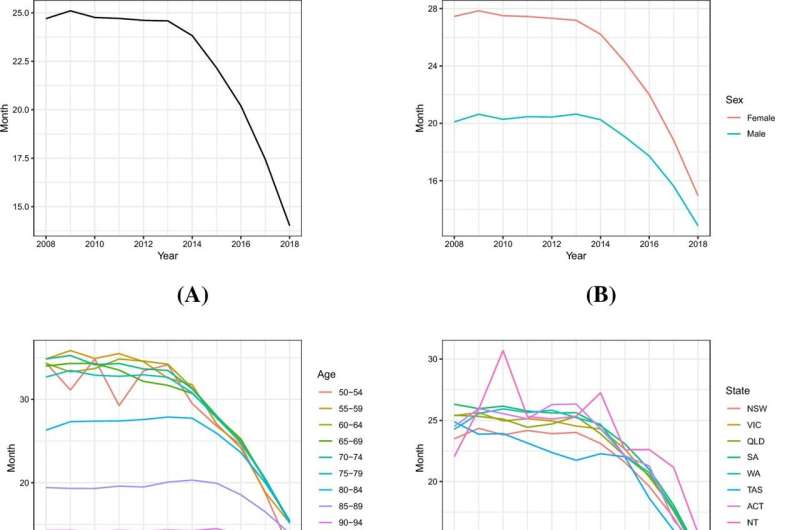This article has been reviewed according to Science X's editorial process and policies. Editors have highlighted the following attributes while ensuring the content's credibility:
fact-checked
trusted source
proofread
Single women in Australian aged care need more funding as new data show widows living longer

Australians currently spend about two years in residential aged care and this is projected to gradually decline by 2040, according to new Macquarie Business School research published in the Journal of Population Research.
This is the first time researchers have predicted the future trends of "length of stay" in aged-care facilities in Australia.
Yet over the same period, the amount of time widowed women aged between 50 and 79 years will live in residential care is expected to increase to an average of 45 months, says lead researcher Dr. Colin Zhang, who is a senior lecturer in the Department of Actuarial Studies and Business Analytics.
"This is a trend we need to pay attention to and think about what interventions the government can make now to ensure women have a good quality of life in residential care," says Dr. Zhang, who is course director of the Bachelor of Actuarial Studies.
Aged care is assuming greater importance as the number of older people in Australia increases faster than other demographic segments. The quality and safety of services are under closer scrutiny thanks to the findings of the Royal Commission into Age Care Quality and Safety, which were handed down in 2021. The Royal Commission's final report made 148 recommendations for reform across the aged-care system in Australia.
The latest figures from the Australian Institute of Health and Welfare (AIHW) from 2020 show 4.2 million Australians were aged between 65 and 85, while 580,000 people were aged over 85 years. By 2042, there will be 6.7 million people aged between 65 and 85 years old and 1 million people aged over 85 years.
Aged care is the last resource for most people when they can no longer manage at home, and it's important for them to feel as positive about it as possible.
The lifespan of Australians has increased significantly over the last century, Dr. Zhang says. The most recent statistics released in 2023 show that life expectancy is 81.2 years for men and 85 for women, according to the Australian Bureau of Statistics.
Whether an older person has a partner or not affects the timing of their move into residential care, says Dr. Zhang. With a partner who can care for them, most seniors are able to remain living in their homes for longer and spend less time living in residential care. Women generally face a longer time of being frail and living without care from their spouse, the researchers found.
Widowed or unmarried women who are in reasonably good health sometimes go into residential care earlier because they have unmet psychological and social needs, he says.
As a result, Dr. Zhang recommends government agencies invest more money in improving services for women in aged care to boost their well-being. Improvements could include creating more family-friendly spaces for relatives and children to visit, and increasing accommodation to allow overnight stays by family members.
Home care preferred
As part of their research, Dr. Zhang's team analyzed data collected from 700,000 seniors between 2008 and 2018, and discovered from 2016 onward, the time people spent in residential care began to decline.
This paralleled the growth in people receiving in-home care. From 2011 to 2021, the number of people receiving in-home care grew substantially (by 246%), according to the AIWH, because of increased government investment.
"We suggest that continued and increased investment in home-based care will mean people receive better services at home, and they will stay out of residential care for longer. This is the best outcome for everyone. Most people want to remain living at home for as long as possible," Dr. Zhang says.
Better home safety initiatives, increased access for seniors to clinical and medical support and expanded community-based social programs would keep seniors in their homes longer, Dr. Zhang says.
"Aged care is the last resource for most people when they can no longer manage at home, and it's important for them to feel as positive about it as possible," he says.
More information: Jinhui Zhang et al, Expected length of stay at residential aged care facilities in Australia: current and future, Journal of Population Research (2023). DOI: 10.1007/s12546-023-09320-z
This content was originally published on The Macquarie University Lighthouse.



















